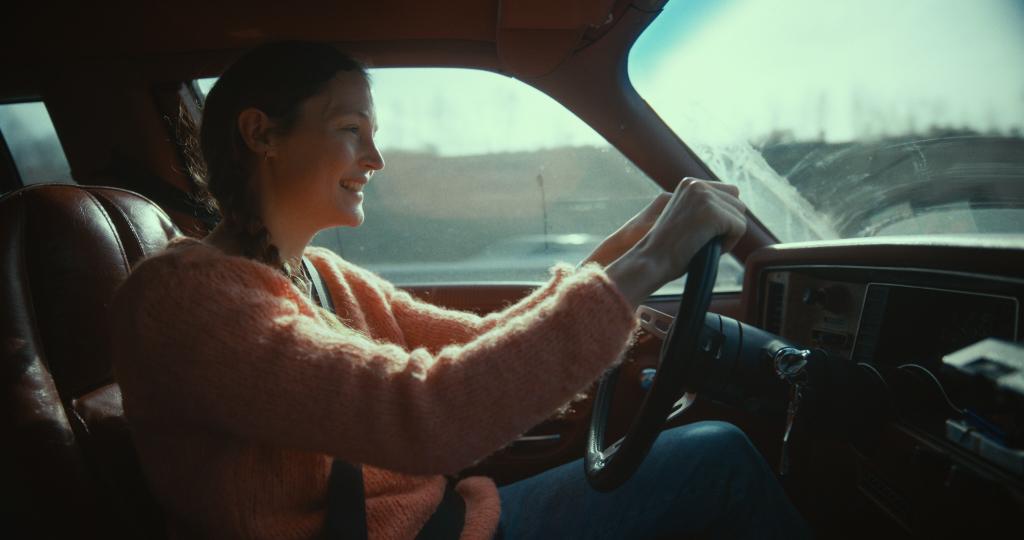France, 2021
Directed by Mathieu Amalric
With Vicky Krieps (Camille), Arieh Worthalter (Marc), Juliette Benveniste (Lucie as a child), Anne-Sophie Bowen-Chatet (Lucie as a teenager), Sacha Ardilly (Paul as a child), Aurèle Grzesik (Paul as a teenager)

She roams gingerly around the house, wary, worried. She puts on her clothes, picks up a few belongings, at one point carefully checks what is going on in the big bedroom of the kids, and eventually, and reluctantly, leaves the place, and gets on an old, red, rather small, station wagon.
The few scenes following up this opening sequence shot in the dim light of a dawn by a camera moving up close to the lead character confirm the plot probably deals with a woman who just ditched her ordinary, married life to look elsewhere for something else. Driving is her only purpose while her husband, daughter and son must fend for themselves, trying to cope with her sudden disappearance. Those scenes, however, do not seem eerily to fit into a clear and logical, narrative pattern for a long time, the montage injecting willfully some confusion and scattering randomly the reactions and behaviors of the characters. The story of Camille making a fresh start out of the blue, unable to stay with Marc, the nice hubby, Lucie the smart elder kid, and Paul the playful junior kid, three individuals now stranded in the stream of life looks like a puzzle.
And fragmentation, muddle, and uncertainty grow bigger: editing becomes dizzying and astonishing, time seems to rush forward at a puzzling pace before being rewound, puzzling and implausible scenes echo the words of Camille or reflect her feelings even as she is cast plainly as a woman drifting away, losing her poise and any common sense behavior or reaction. The film gets unwieldy and even more unsettling. As it juggles heartbreaking moments and astonishing developments, it becomes difficult to keep track of the timeline and to consider the images genuine representations of the reality.
Actually the feeling grows Camille has lost her marbles, and that far from being parallel, the story of her wandering across France and the one about how Marc grows older and different and how the kids grow up, Paul a dreamer fond of adventures and Lucie a keen, gifted pianist, are one stunning and delirious flow of fantasies from a borderline mind. Until, of course, some scenes near the end offer continuity with a previous, highly dramatic episode in the Pyrénées: fast enough the bits of the puzzle can be put together, and the clear and logical end emphasizes what has been at stake all along, the painful effort to remember and the exalting effort of imagining.
This is a painstaking and passionate exercise in match cuts, most of the time with a key visual element, but sometimes just a sound would do it. It could have yielded an affected, blandly sophisticated movie, but director Mathieu Amalric manages to keep it riveting and above all to make it a powerfully and convincing emotional expression stemming from the sincere and strong love relatives of a family can have for each other. The confusion can sometimes go too far, with scenes a bit too extravagant (that preposterous moment when Lucie as a teenager becomes the look-alike of pianist Martha Argerich for instance), or futile (the first time Camille and Marc met in a nightclub is the only case when the film delves deep into the past, in an odd departure from the focus on recent events and what is cast as the present – this choice is hard to gather, especially as other obvious moments of her family life, like the birth of the kids, are ignored: the film should have either embrace the whole story of this life, or stick to what it is the gist of her obsession). But the film carefully and tactfully lets the audience discover the cause of the sorrow wracking Camille and to feel her pain, to grasp what she is experiencing and to embrace it. The sense of mystery turns out to be a poignant testimony of what grief could be.
There are real parallel lines, after all, in this film: but next to the chronicle of Camille’s pain stands her own narration of what could have been, and should have been. To get over with the horrible loss of her relatives, Camille invents a narrative, becoming out of despair the screenwriter of a film she would never be part of. Cinema, in this case, does not allow simply to retrieve and make sense of the shards from the past and present of a person; it also embodies the power of the mind to create stories that help to come to terms with the most dreadful reality; grief is not only a topic to analyze but the root of many needed fantasies that the film dares to show. But Camille eventually stops telling stories to herself (the how and when is barely acknowledged). When she hits the road again in the final shot, for good, the film also ends: for this time she has managed to accept her fate and to stop mourning. And the film has achieved a stunning, subtle, and at times sublime portrait of a lay, with a consummate and impressive command of montage, camerawork, and details, and thanks to an awesome, nearly faultless and thoughtful performance by Vicky Krieps.

